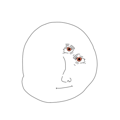Nathan John Cooper (e)k George Orwell (duplicate)(r)en Nineteen Eighty-Four liburuaren kritika egin du
Being in a minority, even in a minority of one, did not make you mad.
5 izar
Edukiari buruzko abisua Spoiler Alert.
This book is so beautifully written and Orwell's extensive vocabulary offers so much in the way of description and meaning. I'm really glad that I have finally read this wonderful classic and can now understand so many of the references to it in modern works. With each chapter, I was smiling at the realisation that 'so-and-so' book/film/song/play from way back when was actually referencing this book. Additionally, the notion of reducing the English language to prevent heretical statements (and, thus, alliances) is both so intelligently thought-out and horrifying. Living in the 21st century, there are now cameras all around us (in phones, computers, laptops, security systems, buses, trains, airports, restaurants, shops, etc. They are everywhere and) each one of these cameras (generally speaking) has a microphone. So, we are always being watched and listened to. In addition to this, social media has adjusted the linguistic scope of many people and I am in no way claiming to be a logophile of any sorts but, these people use words like 'slay' and 'blessed' or phrases like 'weird flex but okay', 'this ain't it', and 'it's the [] for me' in place of the thousands of pre-existing words and phrases that are around today. All this is to say that we are being watched consistently, we are listened to consistently, and the language of tomorrow is forever adjusting - perhaps even shortening, colloquially. You might think this is a rash proclamation but it's just something I found myself thinking of whilst reading the book. As a university student surrounded by other 18/19 year olds, I find a lot of people frequent these social media (newspeak) terms as a sort-of comfort blanket to use as opposed to having to invoke a short period of silence prior to employing the correct term.
(I hope this does not come across pretentious and I am in no way implying that I am above these people in any way, shape, or form but I just find the evaluation rather fascinating.)

